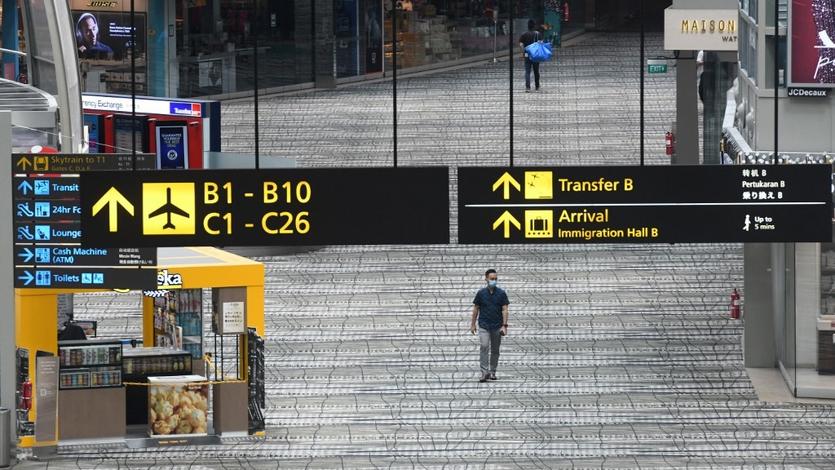 A man walks along the transit area at Changi International Airport terminal in Singapore on June 8, 2020. (ROSLAN RAHMAN / AFP)
A man walks along the transit area at Changi International Airport terminal in Singapore on June 8, 2020. (ROSLAN RAHMAN / AFP)
Singapore is exploring ways to safely open its borders after the coronavirus outbreak led to record losses at the nation’s flag carrier and decimated traffic at Changi Airport, with the government warning that it can’t afford to wait a year or two for a vaccine to become widely available.
A multiministry taskforce is studying how Singapore could let in more travelers and reviewing proposals by stakeholders and the public, Transport Minister Ong Ye Kung said in Parliament on Tuesday. The city-state will accept visitors as long as they agree to testing and tracing, he said.
The city-state will accept visitors as long as they agree to testing and tracing, Transport Minister Ong Ye Kung said in Parliament
“The message we want to send to the world is this – Singapore has started to re-open its borders,” Ong said. “What is at stake is not just hundreds of thousands of jobs, but our status as an air hub, Singapore’s relevance to the world, our economic survival, and in turn, the ability to determine our own future.”
ALSO READ: Singapore allows some travelers to transit through Changi airport
Singapore has pledged about S$100 billion (US$74 billion) in stimulus measures to fight the effects of the pandemic, including wage subsidies and digital-transformation initiatives. Visitor numbers at Changi, once Asia’s third-busiest airport for international flights, has slumped to the lowest since it was built in 1981 and it is now handling only 1.5 percent of pre-virus passenger traffic.
“The status quo is therefore not sustainable for us,” Ong said. “We need to take proactive steps to revive the Changi Air Hub, as a top national priority.”
Even after a vaccine becomes available, “we do not know” if it will work as expected, Ong said. Among measures to spur travel, Singapore could replace its 14-day quarantine requirement upon arrival with stricter and repeated testing and close tracking, he said.
Travel bubbles
Changi, which currently has the capability to swab as many as 10,000 passengers a day, will add a dedicated testing laboratory in the next few months, he said.
READ MORE: Singapore set to lift curbs on Australia, Vietnam visitors
There’s a desire internationally to cautiously open the skies up again, he said, noting that the Hong Kong Special Administrative Region intends to negotiate travel bubble arrangements with countries including Singapore. “We have responded positively,” Ong said, adding that discussions on the matter will hopefully continue soon.
The International Air Transport Association’s (IATA) Regional Vice-President for Asia Pacific, Conrad Clifford, said that establishing travel bubbles for general travelers and replacing the 14-day quarantine with COVID-19 testing “would be positive steps that will help with the recovery of the aviation sector.”
“Imposing a quarantine has the same effect as closing borders,” Clifford said. “That is why IATA has called for the systematic testing of all international travelers before departure.”
IATA, which represents 290 carriers globally, has said it doesn’t see passenger traffic recovering until at least 2024. In a recent 11-market survey of travelers commissioned by the body, 83 percent of respondents indicated they won’t travel if there’s a chance of being quarantined at their destination.
New Zealand, Vietnam
Singapore has eased border restrictions for those traveling from New Zealand and Brunei, testing such passengers at the airport but allowing them to forgo quarantine. Travelers from Australia and Vietnam will be allowed similar access starting Thursday. Singapore has also agreed with China, South Korea, Japan and other countries to allow visitors for business and official purposes.
“Remember that we are small. Our domestic market is not a big bargaining chip,” Ong said. “Instead, what we need to have, is a mindset of generosity, required of a hub. We must open up slowly, carefully, and holding each other accountable for our collective safety. But open up we must.”


